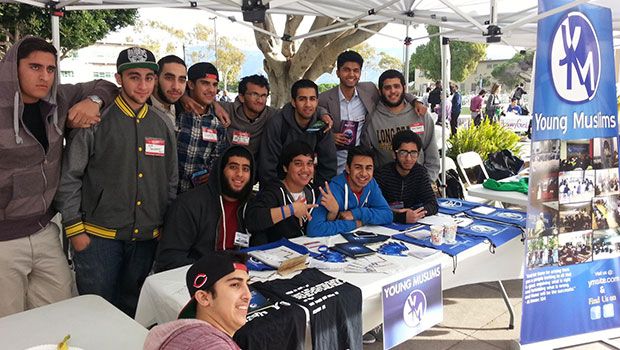Islam prescribes a comprehensive code of conduct, enabling everyone to perform his/her obligations. This binds believers together into perfect unity and solidarity. Their mutual relations should be like the one found among brothers. This is both the prerequisite of faith and part of human nature, and it is alsoendorsed by commonsense and reason.
Those pledging allegiance to Allah abandon their loyalty to all else and are devoted wholly to Allah. If believers did not have cordial mutual relations, it would be very odd, for ideological affinity serves as the most important unifying bond. This demands that believers should close ranks in all stages of their struggle for Allah’s cause. Once one devotes oneself to the cause of truth, one stands in need of help, support, sympathy, consolation and comfort from all members of the community of believers. If one fails to get this, it represents a serious loss, which can’t be compensated for in any other way.
The activists on the path of Allah should be as close to one another as two real brothers are, who are not prepared to let any difference affect their relationship.
The main objective of faith is to bring about a moral and social change on a universal scale. The establishment of Islamic society calls for strong fraternal relations among the Muslim community. It is not, of course, an easy goal to reach. For it involves numerous problems and challenges. Everyone’s contribution is of the utmost significance in achieving this ideal. No one is expected to lag behind in delivering what is expected of him. It goes without saying that men with excellent morals and manners have always been few.
The Need for a Powerful Social Bond
No change can be brought about without the emergence of an organized and powerful group. And such a group is formed only when its members are fully united. They are expected to be unified like a solid rock in striving in an organized manner for their objective. This point is eloquently made in verse 4 of Surah al-Saff, where they are described as “bunyanun marsus,” a solid cemented structure (Quran 61:4). The community of believers should not let any divisive tendency raise its head. For proper organization alone is the key to success. Allah issued the following directive to those at the helm of the fledgling Islamic society of Medina: “O believers! Persevere in patience and constancy; vie in such perseverance. Strengthen each other and fear Allah that you may prosper” (AI ‘lmran 3:200).
At the conclusion of Surah al-Anfal, cordial relations among Muslims are set out as an essential condition for Muslims, in accomplishing an Islamic social change. It is specifically mentioned that those professing Islam should give up everything in preference for their faith, devote themselves heart and soul to their faith.They display mutual love and friendship and the term “wilayah” is used in this context: “Those who believed and adopted exile and fought for the faith with their property and their persons in the cause of Allah, as well as those who gave them refuge and aid —these are all friends and protectors of one another” (Al-Anfal 8:72). While pointing to the organization and resources of unbelievers, the Quran observes that if Muslims do not develop such fraternity, their aspiration to cause a universal Islamic transformation, premised on justice and God-consciousness, will never come true. As a result, the world will continue to reek of mischief and corruption. For without the close tie of fraternity among them, Muslims may not be able to successfully face the forces inimical to Islamic ideals. The Quran says: “The unbelievers are protectors, one of another: unless you do this
there will be tumult and oppression on earth, and great corruption” (Al-Anfal 8:73).Their constant striving in the cause of Islamic society and Islamic social change is the very criterion of their faith: “Those who believe and adopt exile and fight for the faith, in the cause of Allah, as well as those who give them asylum and aid -they are in very truth the believers” (Al-Anfal 8:74). Allah comforted Prophet Mohammad (peace and blessings be upon him) by saying that, apart from His promise of help, He would support him with the Muslim community in his struggle against his foes. For Allah infused a sense of unity into the believers and this would ensure the establishment of an Islamic social order: “He it is that has strengthened you [the Prophet] with His aid and with [the company of] the believers”(Al-Anfal 8:62).
The Hallmark of Brotherhood and Fraternity
Those working for Islamic revival are bound to one another by the bond of fraternity, mutual help and support, and love and mercy. The choice of the term “fraternity” in this context is very apt. For it is an all-embracing term. The activists on the path of Allah should be as close to one another as two real brothers are, who are not prepared to let any difference affect their relationship. Rather, they are ever ready to sacrifice all that they have for each other. They are constantly engaged in helping, supporting and reinforcing their brother. They share each other’s sorrows and happiness and take them into their confidence in mutual affairs. They are drawn towards each other by a strong bond of love, which urges them to cooperate with each other. Those devoted to the cause of Islam exhibit similarly close relations. The more they are committed to this, the closer their relationship is. For they maintain this relationship only for the sake of Allah. They are concerned about their fellow workers. If they lack this concern, however, they should reconsider their claim that they are committed to the faith. Prophet Muhammad (peace and blessings be upon him) speaks of this fraternity as part of the believers’ love for Allah. This brings out the purity and captivating nature of this relationship. Since this love is related to Allah, it purges it of all impurities and imperfections. It is both a logical move and an impulse. For believers it serves as a norm for measuring their devotion to the cause.
Faith in, and love for, Allah go hand in hand. One cannot and does not exist without the other. Rather, one’s absence makes the other doubtful. The Prophet (peace and blessings be upon him) is on record as having observed: “You cannot be true believers unless you love one another” (narrated by Abu Hurairah and cited in Muslim). One of the prerequisites of faith is that one’s love and enmity should only be for Allah’s sake: “One who loves for the sake of Allah and has enmity with someone, again, for the sake of Allah and gives and forbids anything for Allah’s sake, is the one to have accomplished faith” (Abu Dawud). It is borne out by history that friendship and hostility among men have influenced the course of events in world history. If these are linked exclusively with Allah, it amounts to taking a perfectly logical step. Faith has many branches and each of these is equally important in its own right.
Love for Allah’s Sake
Love for Allah’s sake is essential for a stable society and for its accomplishment. Likewise, an organized community is the prerequisite for bringing about Islamic social change and transformation. It is reported on Abu Dharr’s authority that “Once the Prophet asked us, ‘Do you know which deed is the best in Allah’s sight?’ Some replied, ‘Prayer, zakat and jihad.’ However, he clarified, ‘It is love and hostility for the sake of Allah which He likes most'” (Abu Dawud). On another occasion, while addressing Abu Dharr, he (pbuh) asked: “Which is the strongest element of faith?” He [Abu Dharr] pleaded ignorance, saying that Allah and His Messenger knew best. The Prophet then said: “It is love and adversariness for the sake of Allah” (Bayhaqi). Love for Allah’s sake is the most stable support, which enables one to fulfill one’s obligations of faith. This support never betrays one.
Faith covers each and every aspect of life until one’s last breath. One should try to lead one’s life in accordance with the dictates of faith. As a believer has relations only for the sake of Allah, it perfects his faith. It goes without saying that friendship plays an important role in life. One’s devotion to faith may be measured with reference to one’s friendship. Allah therefore directs believers to enter into friendship only with those who are devoted wholly to Allah. Another virtue emphasized in this context is that of perseverance. For it keeps the believers on the right track, safeguarding them against distractions. The Quran’s directive on this count is as follows: “And keep your soul content with those who call on their Lord morning and evening, seeking His face; and let not your eyes pass beyond them, seeking the pomp and glitter of this life” (Al-Kahf 18:28). In the same vein, the Prophet (peace and blessings be upon him) has alerted us to the consequences— positive or negative ¬¬—which are likely to arise out of one’s friendship. One should take the utmost care in selecting one’s friends: “One follows the faith of one’s friend. You should, therefore, think twice before you befriend someone” (Ahmad, Tirmidhi, Abu Dawud, and Bayhaqi).
Friendship stands for love and sincerity. The parable of good and bad friends features in a hadith in terms of joining the company of a perfume dealer. Even if one does not purchase any perfume, one’s heart is freshened by the fragrance permeating the dealer’s shop. By contrast, bad friendship is likened to sitting beside an ironsmith whereby one is bound to be affected by the fumes and pollution. There comes a stage in faith when one starts enjoying the performance of the obligations of faith. The Prophet describes this as the sweetness of faith. One of the features of this stage of faith, according to him, is that one should make a friend only for the sake of Allah. If Allah’s servant is blessed with the love for his Master, it is the height of good fortune for him.
There is nothing to compare with a believer’s love for Allah. For it is his greatest achievement. According to the Prophet (peace and blessings be upon him), those Muslims who love others only for the sake of Allah will be rewarded amply for this. Mu’adh Ibn Jabal is on record as stating that the Prophet said: “Allah says: ‘My love is obligatory for those who love one another for My sake.’ The same holds true for those who join company, maintain social relations, and spend money on others for Allah’s sake”(Muwatta of Imam Malik). In this world one should, therefore, try to develop social relations out of one’s concern for faith, as doing so will be profusely rewarded in the Hereafter. Even a minor good deed, such as giving a date in charity or uttering a good word, will bring excellent rewards. We have already taken note of the implications of inter-personal relations in the context of the Islamic revival.
On the Day of Judgment, many human beings will be panic-stricken, so much so that they will flee from their own parents, brothers, sisters, wives, husbands, and children. They will be more than willing to offer them as ransom for escaping Hellfire. On that day, the worth of friendship will manifest itself in the open. Friends will turn into the worst of foes, including one’s closest friends. However, friendship among the pious will remain unaffected. They will then realize that their good deeds helped them. The Quran brings out this truth thus: “Friends on that Day will be foes, one to another, except the righteous. My servants! No fear shall be on you that Day. Nor shall you grieve” (Al-Zukhruf 43:67-68). One will meet the same fate as the companion with whom one had close ties.
Allah’s pious servants who loved each other for His sake will join company there, even though they might be at some distance from each other (Bukhari and Muslim). On the Day of Judgment, there will be fire beneath men’s feet. On their heads, there will be columns of fire. One will be surrounded by fire. There will be a single shade for man to take refuge under, i.e. the shadow cast by the divine throne. The following seven types of men and women will enjoy shelter there, as is informed by Allah’s Messenger. Among them will be those who loved one another for Allah’s sake and joined company for the same end. According to the Prophet, Allah will say on the Day of Judgment “Where are those who loved one another for my glory? I will shelter them today under my shade. Today there is no shade other than my shade” (narrated by Abu Hurairah and cited in Muslim). Such will be blessed with exalted rank, as is promised by Allah: “Those who love one another for My glory will enjoy light in the Hereafter. Even messengers and martyrs will envy them” (narrated by Mu’adh Ibn Jabal and cited by Tirmidhi).
Strong relationships for Allah’s sake and based on the foundation of faith are of the utmost importance for any Islamic cause. Any weakness on this count should be taken seriously, as the Quran contains severe warnings against those who sever relations. By the same token, it promises immense reward for those who settle disputes and reconcile their difference amicably, for the sake of Allah.
In the early history of Islam, the Muslim community was fortunate enough to enjoy mutual love and unity and a strong sense of fraternity and solidarity. This point is eloquently made in the Quran and is mentioned as a divine favor: “And remember with gratitude Allah’s favor on you. For you were enemies and He joined your hearts in love so that by His grace you became brethren” (Al-‘Imran 3:103). In Surah al-Anfal (8:63), while addressing the Prophet (peace and blessings be upon him), Allah makes the point that even if he were to spend all the wealth in the world he could not have united all Muslims. This signifies Allah’s power and authority. Not only did He bless Muslims with faith, He enabled them to profess this faith, which produced, in turn, mutual love among them.





